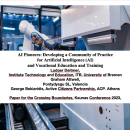With my three previous blogs I have started a series of posts reporting on the European Conference on Educational Research (ECER 2017) that took place last week in Copenhagen. The first post outlined a working agenda with themes to be covered. The second post provided insights into my own presentation. The third post discussed the themes 'qualification frameworks' and 'credit transfer'. With this fourth post I try to give an overview on presentations that discussed reforms in vocational teacher education or issues related to practicum studies of teacher candidates. Here I am facing a multitude of presentations and sessions and I cannot even try to give comprehensive characterisations of them. Instead, I try to list the presentations below as thematic blocks and make some remarks on each block - with the hope that I get access to published 2017 Copenhagen presentations on the Vetnetsite and/or to full papers. At the end I will give links to our (ITB) projects of earlier years that can be read as background materials for the newer contributions.
Vocational teacher education in the light of recent reforms - Danish and Irish experiences
In this block I would like to discuss the two studies presented in the same session:
Vocational Teacher Education and Vocational Didactics - authored and presented by Henriette Duch from Denmark and
The Students’ Experience Of FE Teacher Education Qualification (TEQ) Programmes: A Study of FE Teachers Professional Development And Evolving Identity In Ireland: North and South - authored by Anne Graham Cagney, Carol Yelverton- Halpin, Ned Cohen and presented by Anne.
Both presentations gave a picture of reforms that were allegedly aiming to support pedagogic autonomy of vocational schools or to upgrade the level of vocational teacher education. In both cases the presenters brought into picture boundary conditions and side-effects that overshadowed the implementation.
Finding the 'e' in VET and the 'researchers' and 'pedagogists' in VET teachers
In this block I would discuss one single presentation with multiple messages:
What’s In A Name – VET Teachers Acting Upon The Meaning Of The ‘E’ In VET authored and presented by Lewis Hughes.
In this presentation Lewis gave us insights into a conversation approach to motivate and support VET practitioners to include research as part of their professional practice With the help of a framework (adapted from the Activity Theory group around Yrjö Engeström) Lewis is integrating researching related matters with these teachers perceiving themselves as educators and, accordingly, finding an interest in reflection that takes the shape of research. Moreover, when making this experience as a collective, the teachers are able to position themselves as doing ‘research’ as a means of continuing professional development and adding to vocational currency. Associated with this, Lewis referred to the Australian recent initiative of establishing the VET Practitioner Research Network (VPRN) – his Founding Partner involvement in this is adding to informing his research as his research is also informing his contribution to configuring and activity of the VPRN.
I assume that I have picked a key message from Lewis' presentation (among other important points). To me it was important that I manage to bring into contact with Lewis a group of Italian VET teachers who represented the institute Cometa Formazione and had established their Cometa Research program based on similar ideas.
The development of VET teacher pedagogy through practice
In the third block I would like to discuss the presentations of the final session of the VETNET program at ECER 2017:
Development of practicum pedagogy to enhance VET teacher learning - authored by Ingela Andersson, Ingrid Berglund, Ingrid Henning Loeb, Viveca Lindberg and presented by Ingrid from Göteborg.
The practice of feedback in practicum periods in VET – case of Swedish-speaking Finland – authored and presented by Birgit Schaffar-Kronqvist from Turku/Åbo.
Developing novice VET teachers’ pedagogy: A work-based learning curriculum framework – authored and presented by Susanne Francisco from Australia.
Here the two first presentations by Ingrid and Birgit discussed the shaping of vocational teacher education programs by universities in Sweden and in (Swedish-speaking) Finland. These programs are delivered by universities (or by universities of applied sciences) independently of the Bachelor-Master structures. The volume of the program is in Finland 60 ECTS points and in Sweden 90 ECTS points. Both programs can be studied as full-time students or as part-time students. The learning arrangements are appropriate for teacher candidates who are already working as teachers without formal qualification, and for people with vocational backgrounds without teaching experience. The schedules (with on-the-job learning and presence sessions) are attractive for adult learners who want to shift to teacher occupation. However, in both cases the presenters reported on tensions regarding the role of practicum (practice-based learning period) and challenges, how to implement these periods in a such a way that the VET teacher candidates have new learning experiences.
In this context Susanne Francisco brought into discussion theoretical insights (with reference to Stephen Kemmis from Australia, who also attended the session) and selected examples from the practice. She also presented some exemplary ‘learning journeys’ that demonstrated, how teacher candidates’ learning processes in practicum can be kept at ‘ordinary’ level or enhanced or driven into dead ends. Altogether, we had an interesting discussion
Revisiting 'Vocational teachers and trainers' and 'Practice-based learning' as prior European project themes
I am aware that I have only scratched the topics above and not really entered them. That is why I have presented them as thematic blocks that I want to revisit in due time. In this context I also want to revisit the materials of some earlier European projects in which I was involved in one way or another, such as:
- The Europrof project and its follow-up activities (Training of new VET professionals; 1996 - 2001)
- The UNIP network for developing an international framework for TVET teacher education (2004 - 2006)
- The TTplus project in Europe (focus on trainers) and TT-TVET project in Europe and Asia (2006 - 2009)
- VET teachers and trainers - Consultation seminars in six European regions (2008 - 2009)
- The Euronet-PBL project (Practice-based learning in engineering, business management and VET teacher education (2008-2010)
I have collected the materials on ResearchGate to the following two Project spaces:
Workplace Learning/ Practice-Based Learning - Legacy of European projects 2005 - 2012
Teachers & Trainers in Vocational Education &Training - Legacy of European projects 1995 -2010
and regarding ECER conferences
- - -
I think I have made enough notes and taken plenty of homework for the time to come. In my next post I will report on a very interesting workshop at ECER 2017.
More blogs to come ...








